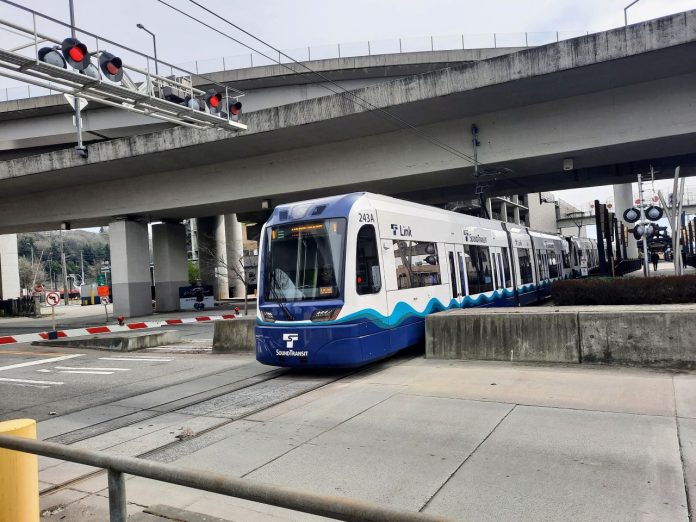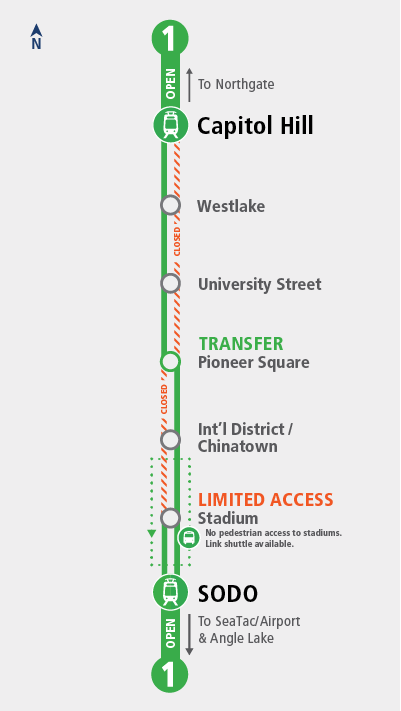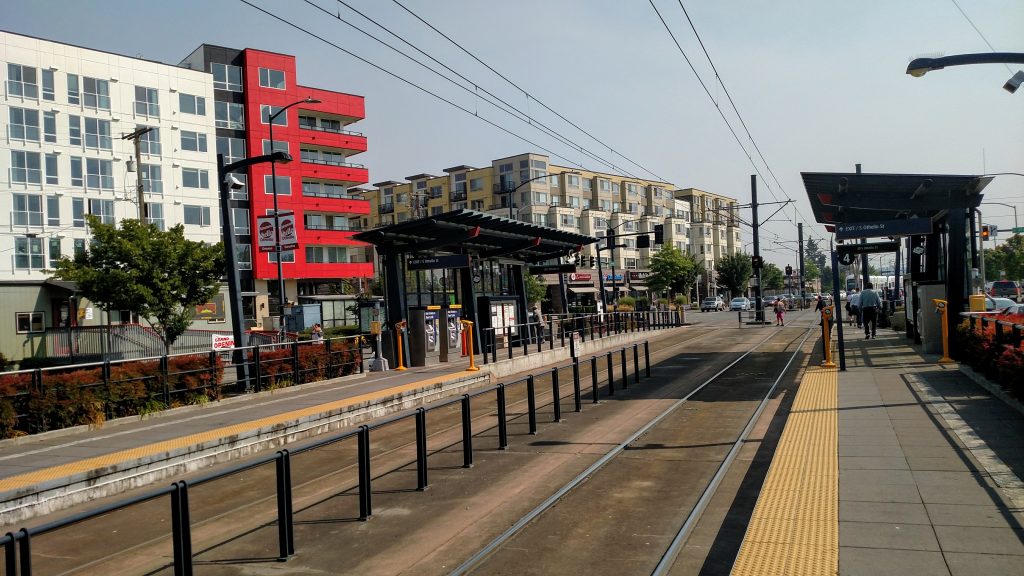
Reliability issues caused the switch to longer headways for the remainder of the SoDo maintenance project.
Sound Transit is the midst of maintenance work in SoDo to address flooding issues on light rail tracks near Stadium Station. The agency is single-tracking trains between Pioneer Square Station and Stadium Station with forced transfers at Pioneer Square to continue in either direction. The agency has planned to maintain 15-minute frequencies during the work, but switched to 20-minute frequencies on Wednesday due to issues maintaining the schedule. This service disruption will continue through Sunday, August 20, the agency said, which is a day longer than announced last month.
A rider alerted The Urbanist to the switch, which Sound Transit had only announced once the switch had been put in place Wednesday, leading to some rider confusion and frustration.
John Gallagher, a spokesperson for Sound Transit, said the agency expects the switch to be more convenient for riders due to the ability to allow for train meets at Pioneer Square Station (PSS). Train meets means a train is already waiting for riders who are forced to change trains at PSS due the truncated service pattern during the maintenance work.
“It means longer headways but it’s a better experience for the majority of passengers who are connecting to continue their trip,” Gallagher said in an email. “We had 15-minute headways with up to 12 minutes for transfer time at PSS. This afternoon we moved to 20-minute headways, which gives us the opportunity to allow for train meets at PSS. This would reduce the overall trip time for passengers traveling through PSS.”

While the train meets should make travel that continues through Pioneer Square Station a bit more seamless, riders will notice longer waits throughout the network as 20-minute frequencies mean an average wait of 10 minutes at riders’ station of origin. Sound Transit did not have statistics handy on what share of light rail trips involved transferring trains at PSS, but it did note it was a high volume and the inability to offer train meets was leading to frequent complaints.
“We are seeing a high volume of transfers at Pioneer Square,” Gallagher added. “We’ve been hearing from riders there that they have been frustrated by the lack of synchronization between trains for the transfer so this improves the experience for them.”
Sound Transit had hoped to get train meets to work with 15-minute frequencies, but that didn’t happen in practice. The agency didn’t elaborate on why that is, but it could be that the variability of traffic signal delays through the mixed traffic sections in SoDo and in the Rainier Valley threw off the timing.
“The move to 20 minutes was promoted by a couple of things,” Gallagher said. “We weren’t able to make the train meets work with 15-minute headways and the 15-minute intervals weren’t always proving to be as reliable as we expected.”
Last month, Stephen Fesler laid out why the SoDo track repairs were necessary: “Earlier this year, flooding of the tracks at Royal Brougham forced an emergency repair at the crossing. This caused severe service disruptions and a period of single-tracking operations to address the problem. A permanent fix will involve replacement of the track and drainage improvements, thereby allowing the agency to lift a 10 mph slow order and operate trains at normal speeds through the section.”
Once completed, the work should mean faster service through SoDo and hopefully no flooding issues down the road. Sound Transit CEO Julie Timm added that this work needed to be down in the dry season.
“Royal Brougham needs to be reconstructed based on underlying soil conditions causing the elevation of the alignment to sink and the depressed track area increases high water buildup that causes us to have slow performance in these areas,” Timm explained. “It needs to be completed during the summer season, not the rainy season.”
Sound Transit is expecting to wrap up this maintenance project, which is part of a series of work branded as “Future Ready,” on Sunday August 20, but is planning to kick off another round of work in the Rainier Valley on Monday August 21.

“A longer second service disruption period will run from August 21 through September 17. Timm said it will be focused on reconstructing platform tiles at Othello and Rainier Beach stations just like last year at Columbia City station,” Fesler explained. “Single-tracking operations will be put into service in around the stations in the Rainier Valley…” On August 21, Sound Transit announced previously planned 12-minute frequencies would be revised to 15-minute frequencies to facilitate the tile work, which appears to be due to their difficulty maintaining the more ambitious service schedule.
After pushback against big service disruptions stemming from poorly planned maintenance work in Columbia City, Sound Transit pledged efforts to reduce service disruption and better communicate plans. However, the example from this week shows sometimes those more ambitious service plans cannot be met, pushing the agency to lower service levels midway through. Either way, riders are caught holding the bag.
Update: This article was updated on Tuesday, August 22 with the new service schedule for the tile work August 21 to September 17.
Doug Trumm is publisher of The Urbanist. An Urbanist writer since 2015, he dreams of pedestrian streets, bus lanes, and a mass-timber building spree to end our housing crisis. He graduated from the Evans School of Public Policy and Governance at the University of Washington in 2019. He lives in Seattle's Fremont neighborhood and loves to explore the city by foot and by bike.

